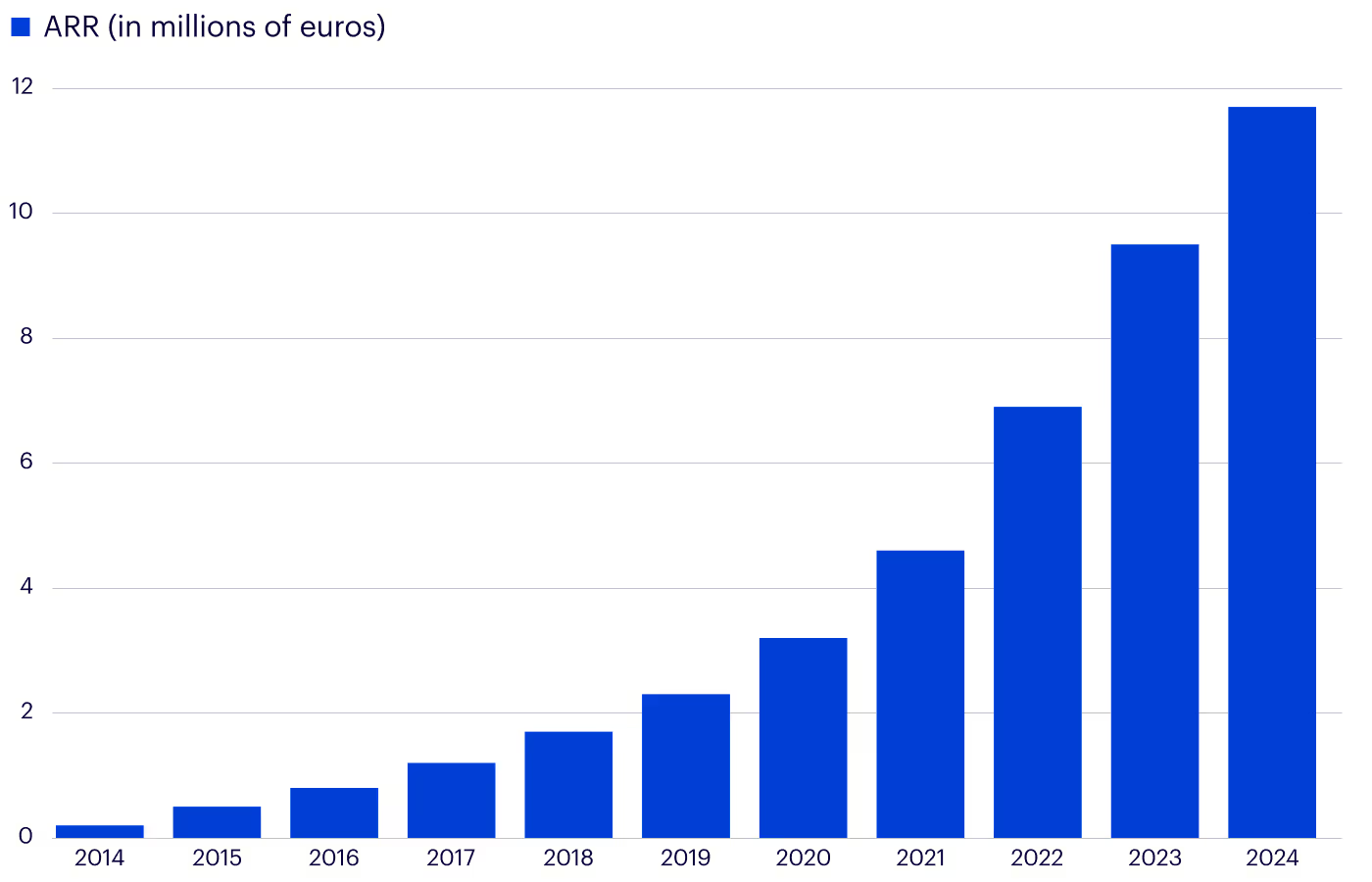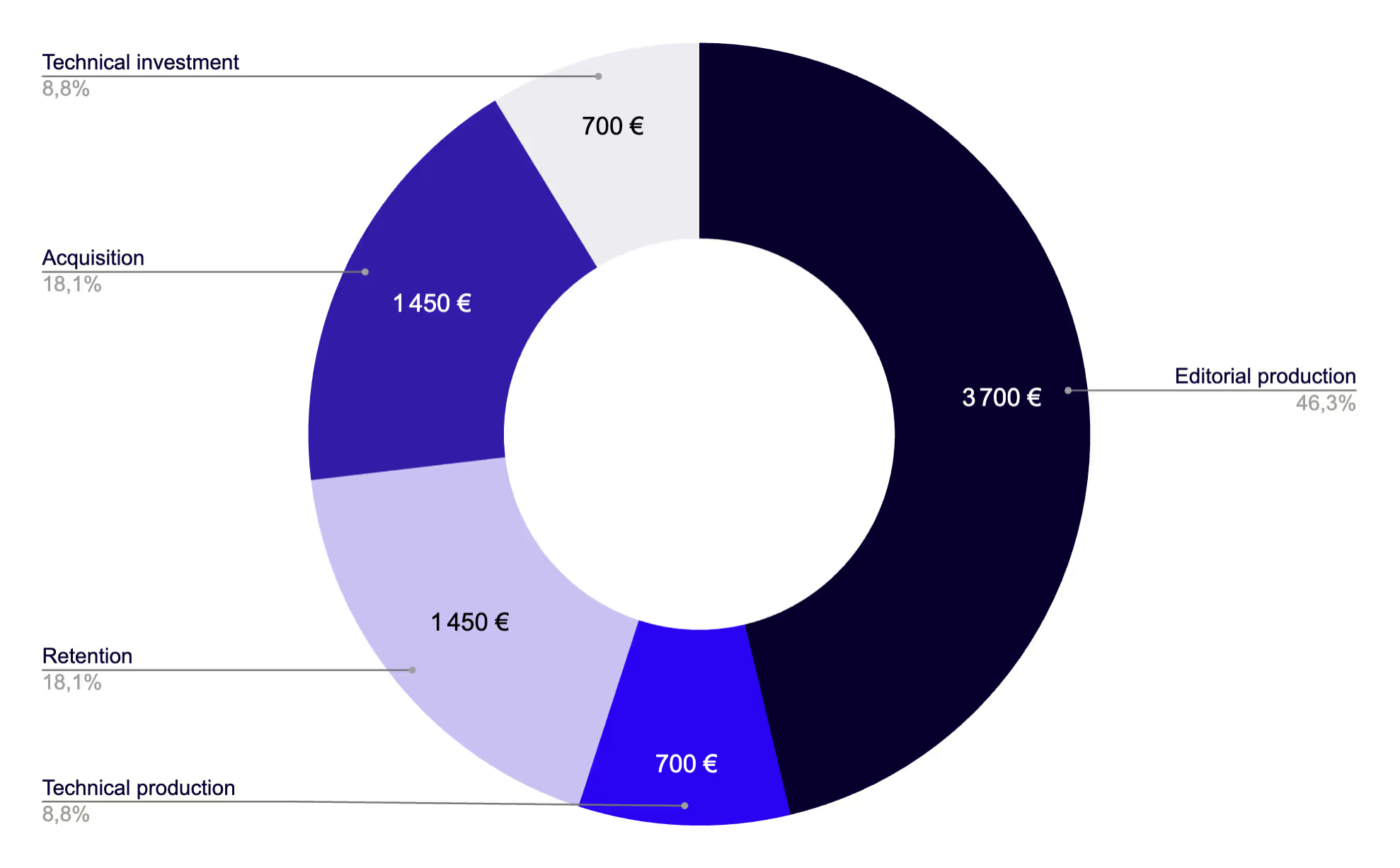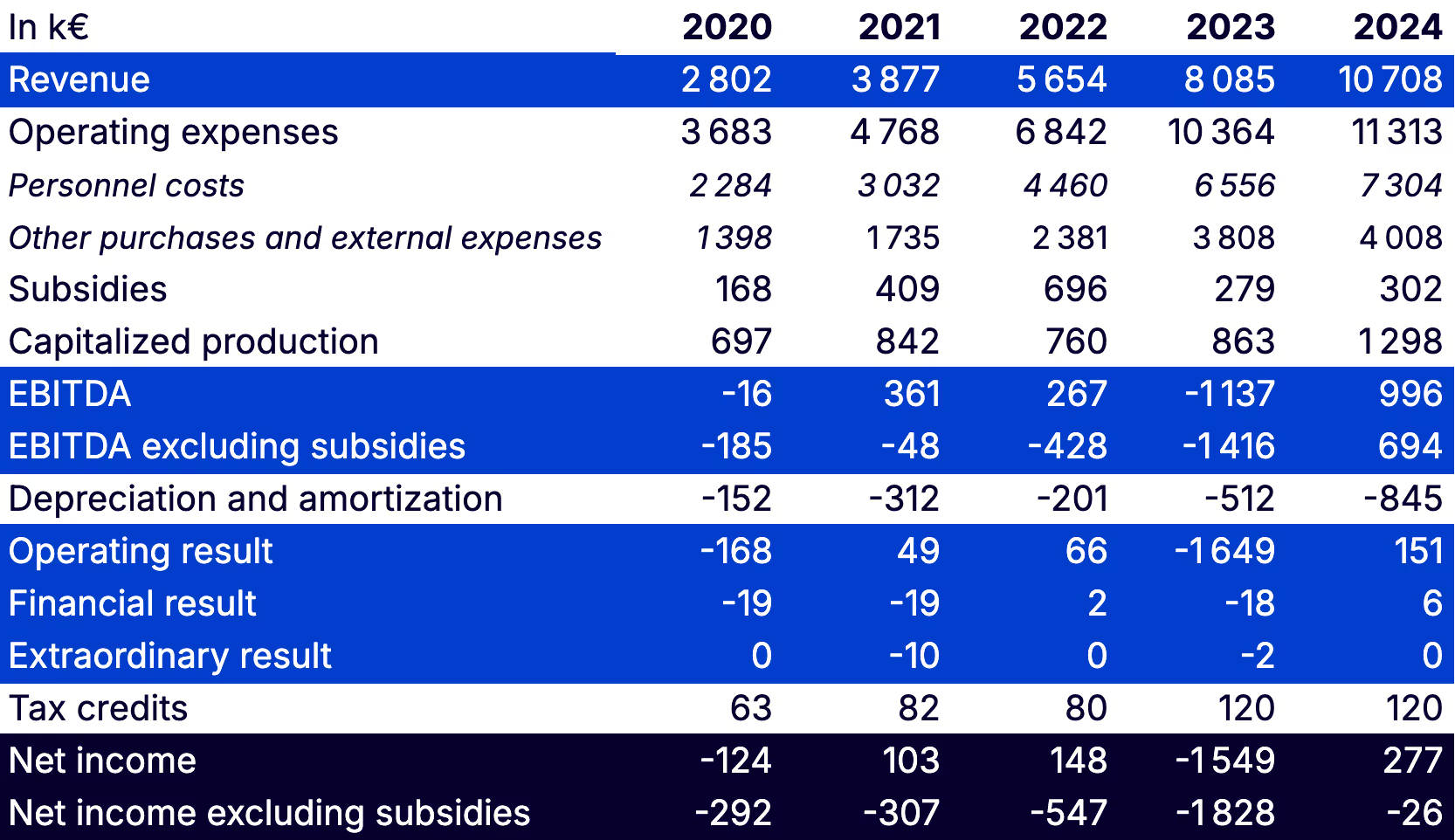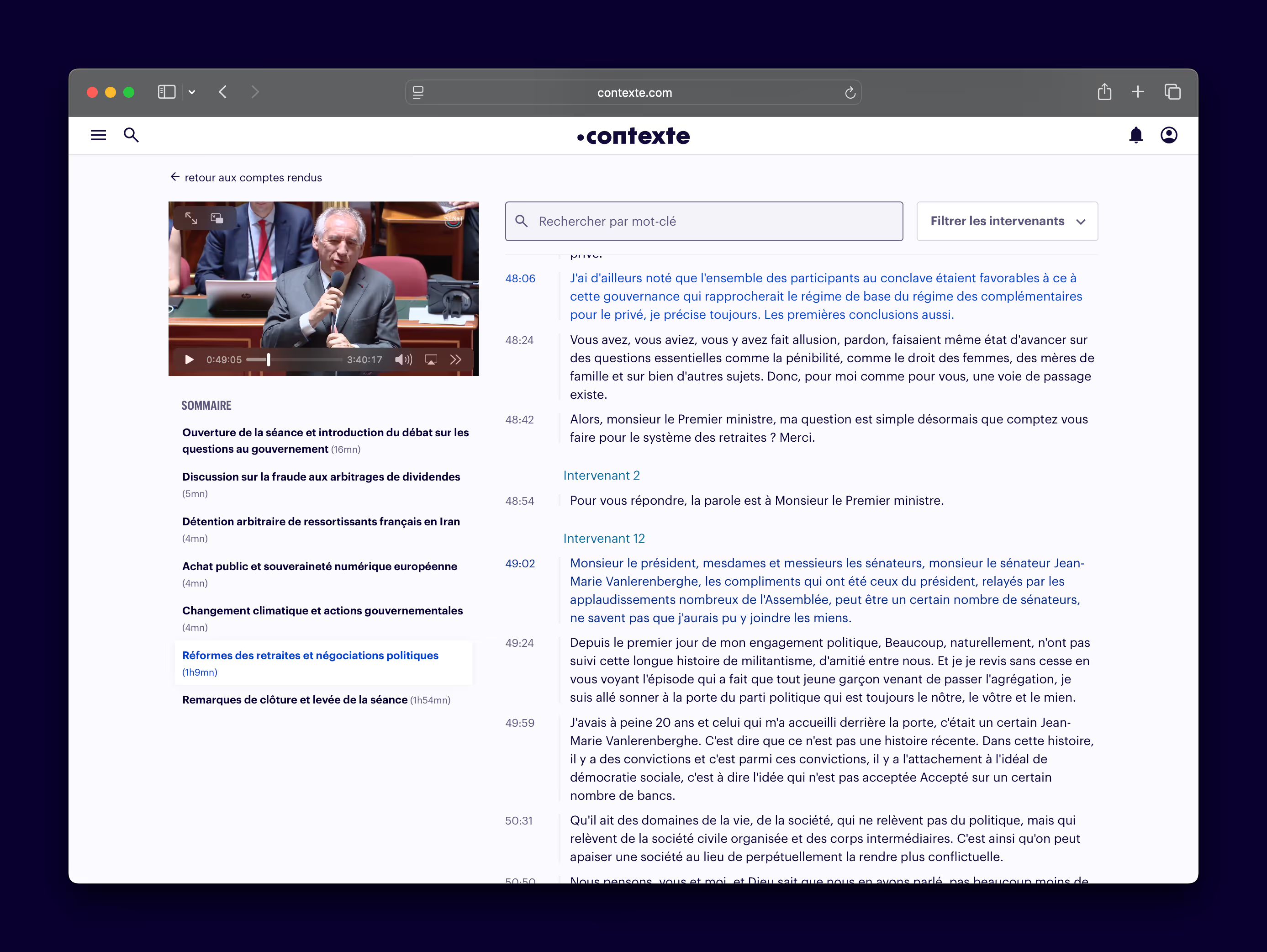our impact
in 2024
Editorial
What to take away from 2024?
Contexte is guided by one mission: to inform democracy stakeholders. Are we up to the task? We are publishing our second impact report to find out.
For our newsroom, 2024 was a year that could diplomatically be described as ‘eventful’ — it was both difficult and exciting. In Paris, the dissolution of parliament, the weakening of the majority and government instability disrupted political practices, and therefore ours too. In Brussels, the institutional renewal process was planned in advance, but still intense. Our 54 journalists demonstrated the breadth of their expertise through countless scoops and consistently useful analysis.
Our product kept improving, with new features such as AI-transcribed parliamentary hearings. We also developed our own content management system (CMS) to improve productivity, user experience and our independence (no more Google Docs!).
Subscribers noticed these changes: we gained 2,000 new members across 200 organisations. The churn rate fell to 9% year-on-year, and subscription revenue grew by 23% to €11.7 million.
As a result, we have become more financially independent, generating a net profit of €277,000. We ended the year with €1.5 million in available cash — €1.3 million more than a year earlier.
These successes shouldn’t overshadow the challenges some teams faced. Growing from 50 to 120 people in three years has changed internal needs and created tensions. At the end of 2023, the sales and marketing team needed more structure, with clearer roles and workflows. In October 2024, the team was transformed, splitting into two (sales and marketing), creating squads (autonomous, cross-functional teams focused on specific customer segments) and merging certain roles. Changes in team leaders created uncomfortable situations until managerial stability was restored.
2024 was a year of consolidation. We took the time to structure the organisation after years of rapid growth. We also prepared major new developments for 2025: a new commercial offering and our first vertical — Energy — designed for European public affairs professionals, in English.
I feel we are stronger and more ambitious than ever.
our
independance
Contexte cannot achieve its mission to inform without being independent. This status enables us to align all our interests: those of our shareholders, our team, our readers and the broader ecosystem. That is why, each year, this report assesses the development of our independence, or rather our in(ter)dependencies: capital, economic and editorial.
In 2024, Contexte’s capital remained unchanged: it is still wholly owned by the employees. This year of consolidation was marked by continued growth and a return to profitability. The investments made in previous years paid off.
Capital independence
What do we mean by ‘capital independence’?
Control (i.e. the majority ownership of the company) belongs to individuals or organisations whose primary interest lies within Contexte itself. In this, we follow the
This refers to the fact that power (i.e. the majority of the company’s capital) belongs to individuals or organisations that do not hold majority interests in companies other than Contexte, on the basis of the definition by Spiil.
100 %
of the capital belongs to the team
There was no capital increase in 2024. A new increase reserved for the Société des salariés de Contexte (Contexte employee company) was conducted in March 2025.Société des salariés de Contexte
Economic independence
What do we mean by ‘economic independence’?
Simply put, profitability. Without enough revenue to cover our costs, independence becomes meaningless. Our profitability must be strong enough to finance our growth without relying on external capital.
€11.7 M
of recurring annual revenue as of 31 December 2024
23 %
growth in recurring annual revenue compared to 2023
Continued growth
With a 23% increase in annual recurring revenue compared to 2023, 2024 was no exception: growth has continued at a steady pace.
All of our verticals have grown: the Health (+53%), Tech (+40%) and Media (+40%) verticals — our most recent additions — have seen the strongest growth in proportion.
Why do we track annual recurring revenue rather than turnover?
The key indicator commonly used to measure subscription-related revenue is annual recurring revenue (ARR). This is the sum of the amount of each subscription contract allocated over a year. While turnover provides a snapshot of average business volume over the past year, annual recurring revenue provides a more current view at a specific point in time, in this case at the end of the year.

ARR as of December 31 of each year (in millions of euros)
100% of revenue comes from subscribers
There is no advertising at Contexte. No sponsorship.
What does a Contexte subscription pay for?
For an average annual subscription of €8,000:

2024: a year of consolidation


Our growth is the result of investments made in recent years: new verticals (Health in January 2023, Tech and Media, which replaced Digital in November 2023), doubling of the sales team between 2022 and 2023, and strengthening of the product, both editorially and functionally, with, in particular, automatic monitoring of French parliamentary activities.
In 2023, we decided to improve our cash flow to increase our resilience and enable us to invest more heavily in the future. This has been a success: the business generated an additional €1 million in cash flow during 2024. We are therefore entering our internationalisation phase stronger than ever.
Are subsidies compatible with independence?
To achieve its mission, Contexte aims to grow while remaining independent. Achieving this dual ambition requires profitability (to invest without raising funds) without subsidies (so as not to be economically dependent on our editorial focus, which is politics). This is why, in the income statement above, profitability figures are shown excluding subsidies. And for the first time in its history, Contexte is close to achieving net profitability excluding subsidies, with a loss of just €26,000.
We believe that subsidies promote our independence — within limits. They are the only source of funding that does not come with any strings attached. A capital investor has voting rights. A lender can exert pressure if there are difficulties in repaying the loan. A subsidy, on the other hand, is a gift without quid pro quo.
We have therefore chosen to accept certain subsidies, those that allow us to remain completely independent, both operationally and editorially. These include subsidies for t he press from the French Ministry of Culture, which we have received regularly since our creation.
In the interests of transparency, here are the grants received by Contexte in 2024: €422,000, i.e. 4% of our turnover, including €289,000 from the Fund for the Promotion of Pluralism in Online-Only Press Services, €8,000 for hiring trainees, €5,000 in cyber subsidies and €120,000 in innovation tax credits.
Editorial independence
What do we mean by ‘editorial independence’?
Editorial independence means creating the conditions for journalists to do their job, within the framework of the editorial line, independently of external powers (both economic and political) and internal powers (the commercial interests of the company, the interests of shareholders).
Enhanced ethics
A subscription-based media outlet survives on the trust of its readers. This trust cannot be dictated; it must be earnt, little by little. In 2017, we adopted and published a code of ethics. It sets out the rules we follow to manage conflicts of interest. We also set up a working group dedicated to ethics. This group is consulted to give advice, check that the code is being followed and add to it if necessary.
In 2024, this working group was expanded to better represent the sales teams. Raquel Letrilliart, account executive, and Céline Perrouault, account manager, joined the group during the year as representatives of the sales teams.
8
consultations of the working group on ethics in 2024
our impact
Democratic impact
To boost our impact, each year we aim to grow our audience, develop our coverage and improve our product. At the same time, we cultivate transparency about how we produce our coverage and run our business.
In 2024, our audience continued to grow and diversify, reaching 1,543 subscriber organisations. The year in which this report was written was particularly intense, marked by one election after another and the dawn of an unprecedented period for the political ecosystem and our Paris-based journalists. At the same time, our editorial team’s work was made easier by the development of our in-house CMS, saving us valuable time. Our subscribers also benefited from AI-powered reports, making it easier to follow parliamentary proceedings.
Audience
1 543
subscriber organisations
+ 14,3 %
subscriber organisations in comparison to 2023
+ 193
subscriber organisations
9 %
cancellation rate (annual, in value)

Sustained growth in subscriptions
In 2024, the number of organisations subscribing to Contexte continued to grow at a steady pace (+14.3%). We now have more than 1,500 subscriber organisations, representing approximately 14,000 readers.
This growth was driven in particular by a busy political agenda, including the European elections, the dissolution of the National Assembly and the no-confidence vote in the French government.
A stronger and more visible brand
We continued to invest in marketing to maximise the reach of our work and audience, with a view to consolidating both our brand awareness and commercial acquisition.
We tested and developed new formats on social media to better showcase our content (short videos to promote the rebroadcast of Contexte Live, carousels to present our investigations and scoops, etc.)
We also ensured our content was accessible to as many journalists from other newsrooms as possible, so that they could read our exclusive news and relay it.
A new commercial offering to reach all our audiences better
We are constantly aiming to better inform those involved in democracy. In 2024, we therefore sought to gain a better understanding of our audiences. We researched the types of customers and prospects we have, their sizes and how they use our content and services, and we realised that our commercial offering no longer reflected the reality of the market. For example, despite the recovery mentioned in our 2023 impact report, our sales team noted difficulties in selling subscriptions to NGOs and educational institutions, mainly due to financial reasons.
We are therefore reviewing our offering with two objectives in mind:
To be better at meeting the new needs of our target audiences.
To be more accessible, to enable all organisations to subscribe, regardless of their size and resources.
A new commercial offering will be launched in 2025.
Journalism
Embracing complexity
In 2024, the Contexte editorial team was preparing for the European elections. Our goal was to help our readers understand these elections over the long term, to grasp their complexity and impact.
At Contexte, we know that it doesn’t all end on election day — quite the contrary. After the vote, a period begins that is at least as important, if not more so, for our readers. We helped them follow the establishment of new institutions and understand the changing political balance of power in detail, not only in parliament but also within the new European Commission and the Council of the EU.
To provide a detailed understanding of what was at stake and what would shape the next five years, we decided — as we often do at times like these — to create a range of tools that are easy to use on a daily basis. In this case, our dashboard tracking this major European event proved invaluable, becoming one of the most viewed pieces of content in Contexte’s history.

But Emmanuel Macron’s surprise dissolution of the National Assembly on the day of the European elections was a plot twist. It forced the Paris editorial team to work flat out, alongside our Brussels office — without even having the time to think about how to organise and cover the story.
In the rush, we decided to stick to robust data to try to understand and analyse the uncertainty we were plunged into.
“We started looking for markers to give to our readers,” sums up Marie-Catherine Beuth, editor-in-chief of Contexte in Paris.
The evening the dissolution was announced, when the new European Parliament was not yet fully known, our data journalist Yann Guégan began working on an electoral map to form the basis of our editorial coverage of the campaign.

Thanks to the database we created in 2022, we were able to create a scalable tool with scripts to increase the number of representations of the 577 constituencies as the campaign progressed. The page was updated before the first round, and then again with the results between the two rounds and after the second round.
“Our journalists are so knowledgeable that, at times like these, their need to understand what is
going on is the same as that of our readers,” says Yann Guégan.
This editorial work, combined with subscribers’ comments and requests for additions, has resulted in a useful tool for a large number of readers — our own and those who were able to benefit from this content that was free on a one-off basis — but also for research purposes.
After the legislative elections, an unprecedented period began for the political ecosystem and Contexte’s Paris editorial team, and it looks set to continue: navigating a structurally unstable political landscape in the absence of an absolute majority in the National Assembly.
The McDonald’s case study
Talking about lobbying strategies to show how they influence the legislative process is one of the facets of Contexte’s editorial mission.
In 2024, Laura Mercier, an environmental journalist in Brussels, investigated McDonald’s lobbying methods in the negotiations on the single-use packaging regulation. This story was one of the most notable case studies of lobbying in our editorial coverage.
Thanks to her in-depth monitoring of the development of this public policy over more than a year, Laura was able to gain access to all stakeholders and, in particular, to analyse in detail how the American fast-food giant managed to tip the balance in its favour.

The final regulations on packaging reuse, adopted by the EU, ultimately excluded the hospitality sector from its scope. Similarly, hamburger and chip boxes were also excluded from the scope and continue to be served at McDonald’s, Burger King and other restaurants.
Forming a coalition with other affected companies to avoid appearing as the sole opponent of a public policy; challenging the impact studies provided by the European Commission; hammering home simple messages through opinion pieces in the European media bubble in Brussels and through posters in the metro; securing the support of key European Parliament representatives, etc.
To oppose this packaging regulation, McDonald’s used a comprehensive range of lobbying tools known in the EU capital.
“By telling this story, my aim was not to influence the negotiations themselves, but to show how lobbying influences public policy-making in Brussels,” says Mercier. The investigation was widely reported in the press (notably here, by our colleagues at StreetPress), and there were numerous reactions from readers. The investigation had repercussions over a long period of time. It was also analysed in detail by its author on a Master’s degree in public affairs.
Product
After growing and restructuring the Tech and Product team in 2023, its production strength was then channelled into innovative projects in 2024.
Developing our in-house CMS is revolutionising the editorial team’s workflow
In January 2024, we rolled out our new CMS to the entire editorial team. Developed entirely in-house, following a participatory and iterative approach involving developers and journalists, it replaced the previous tool built around Google Docs. Beyond the technical independence provided by our new CMS — which we call Echo —, it has significantly reduced the previous stress in journalists’ daily lives, especially when approaching stressful deadlines.Echo offers a much more user-friendly experience, with an interface that enables each journalist to proofread and edit their content in an environment that is very close to the final result. It builds on the real-time collaboration and user-friendly online editing features used previously, but is based on technical components that are mainly open source. Our developer Cédric Raud wrote about the project in detail in this blog post.

Although it is difficult to quantify the impact of this project, it has become the almost exclusive tool used by journalists to write briefings and articles and, since the end of the year, to send exclusive documents and alerts. Some journalists estimate that this new CMS has saved them between ten and twenty minutes a day.
AI-powered reports for effective monitoring of parliamentary activity
+ 1 000
hours of video transcribed
In the autumn of 2024, we launched a new feature designed to make it easier and more accessible to follow parliamentary proceedings: AI-powered reports. Every day, we publish automated transcripts of plenary sessions and committee meetings, produced using the latest advances in artificial intelligence.

The cutting-edge technology we use also enables us to separate the voices of different speakers, making it easier to read these reports. We are currently the only company able to publish transcripts of these public sessions with a high level of reliability, usually within an hour of the video being posted on institutional websites.
Thanks to this feature and the clear and efficient interface we have developed, our subscribers and journalists can view several hours of committee proceedings, search for the moments that are most important to them, and even receive automatic alerts if they have configured custom keywords. This provides easy access to these sessions, which previously required long hours of listening or waiting several days — or even weeks — for the official report to be published.
We are convinced that this type of feature is useful for improving the functioning of democracy by making what happens in institutions more transparent and visible. For the time being, our AI-powered reports focus on French institutions, but we should be able to incorporate European institutions in 2025.
Human impact
Since Contexte was founded, we have chosen to include an internal dimension to our mission. This means we empower every member of our collective, which operates on the basis of individual freedom within a framework built together, combining high standards and goodwill.
In 2024, we began an overhaul of our sales and marketing organisation and updated our ‘Top 30’ remuneration policy.
Collective
105
people (90 in Paris, 15 in Brussels)
35 years
average age
90 %
on permanent contracts
53 %–47 %
female/male ratio
The following joined us in 2024
Warren Akouete, systems & networks technician
Pierre Angrand-Benabdallah, journalist, Authorities
Yann Beauxis-Aussalet, developer
Rémi Blémus, full-stack developer
Sacha Cayre, marketing director
Juliette Droz, transport journalist
Mathilde Elloy, account manager
Mégane Gensous, media journalist
Gaspard Hauff, recruitment officer
Anna Jouyet, agriculture journalist
Deborah Malpertu, revenue operations manager
Overhaul of our sales and marketing organisational structure
A necessity
In recent years, Contexte has experienced significant growth. This expansion has highlighted internal challenges within the sales and marketing team, which we have had to address. The team itself asked for help, faced with conflicts between departments, sometimes unclear responsibilities and difficulties in managing the necessary trade-offs independently.
We were at the end of a cycle, and to support the future growth of our project, we needed to change our working methods. In addition to clarifying the framework, the transformation also aimed to shift from instinct-based decision-making to a data-driven approach and to strengthen our middle management.
A strategic decision was quickly made: to separate the sales and marketing teams.
Sacha Cayre became marketing director in April 2024, marking the creation of the new marketing team. The decision was made to structure it into three departments — brand, growth and product marketing — around a ‘funnel’ vision (the stages a potential customer goes through).
The sales team also underwent an in-depth transformation.
Four key objectives for commercial transformation
- Commercial performance: ensuring the growth needed for our project’s mission Commercial performance: ensuring the growth essential to our project’s mission
- External sustainability: building and maintaining a lasting relationship of trust with our subscribers and customers — because we are in it for the long run
- Internal sustainability: fostering our team’s loyalty by ensuring that everyone feels comfortable and has complete clarity about expectations and objectives
- Efficiency: being economical with resources so that we can invest as much as possible in our product
- External sustainability: building and maintaining a lasting relationship of trust with our subscribers and customers, because we are in it for the long run
- Internal sustainability: fostering our team’s loyalty by ensuring that everyone feels comfortable and has complete clarity about expectations and objectives
- Efficiency: being economical with resources so that we can invest as much as possible in our product.
A collaborative methodology
All members of the sales team participated in workshops to establish how best to organise the team. This transformation led to major changes, including launching a test ‘squad’. These are multi-skilled, autonomous teams focused on a specific customer segment, based around key accounts and creating new roles and merging those of account manager and customer success manager.
As such, 2025 is a year of deployment and support, with the aim of ensuring that this organisation runs smoothly and making any necessary adjustments.
‘Top 30’ remuneration policy
At Contexte, we don’t want people to choose us for monetary reasons, but we also don’t want them to leave for these reasons. We recognise that we do not offer salaries in the top 10% or 20% of the range for a given position. We therefore do not attract those for whom salary is an almost exclusive criterion, but we seek to be among the best on the market to attract the most qualified candidates.
In 2021, we set a target of achieving a wage level for each position in the top 30% of a panel of comparable companies. This target was achieved in 2023.
This salary scale is constantly being developed and is therefore not set in stone. It requires ongoing research and updating to ensure that it is as fair as possible. We have chosen to completely update it every two years, following a detailed comparative assessment.
Why have a salary scale?
- To avoid rewarding the best negotiator
- To promote gender equality
- To offer an objective assessment to limit the impact of decision-makers’ perception biases
- To provide greater visibility on possible salary increases and the skills expected for each position
- To facilitate the management of aspirations and career development
- To attract and retain the best candidates
Bonuses and variable components, listed below, are not included in the amounts shown in this table:
- Journalist: seniority bonuses (€0 to €2k), annual copyright payments (€600)
- Account Executive: variable pay (target €18k to €50k)
- Account Manager: variable pay (target €18k to €50k)
- Marketing Manager: variable pay (target €4k)
- Sales Manager: variable pay (target €19k)
Environmental impact
The issue of our environmental impact has long been neglected within Contexte, with few efforts in place to minimise it.
In 2023, we decided to assess this by conducting a carbon footprint analysis, which was published in our 2023 impact report. Efforts were first made in 2024, particularly in the area of waste management.
We aim to conduct this review of our practices every two years. We will publish the results of the next carbon footprint assessment in the 2025 impact report.

